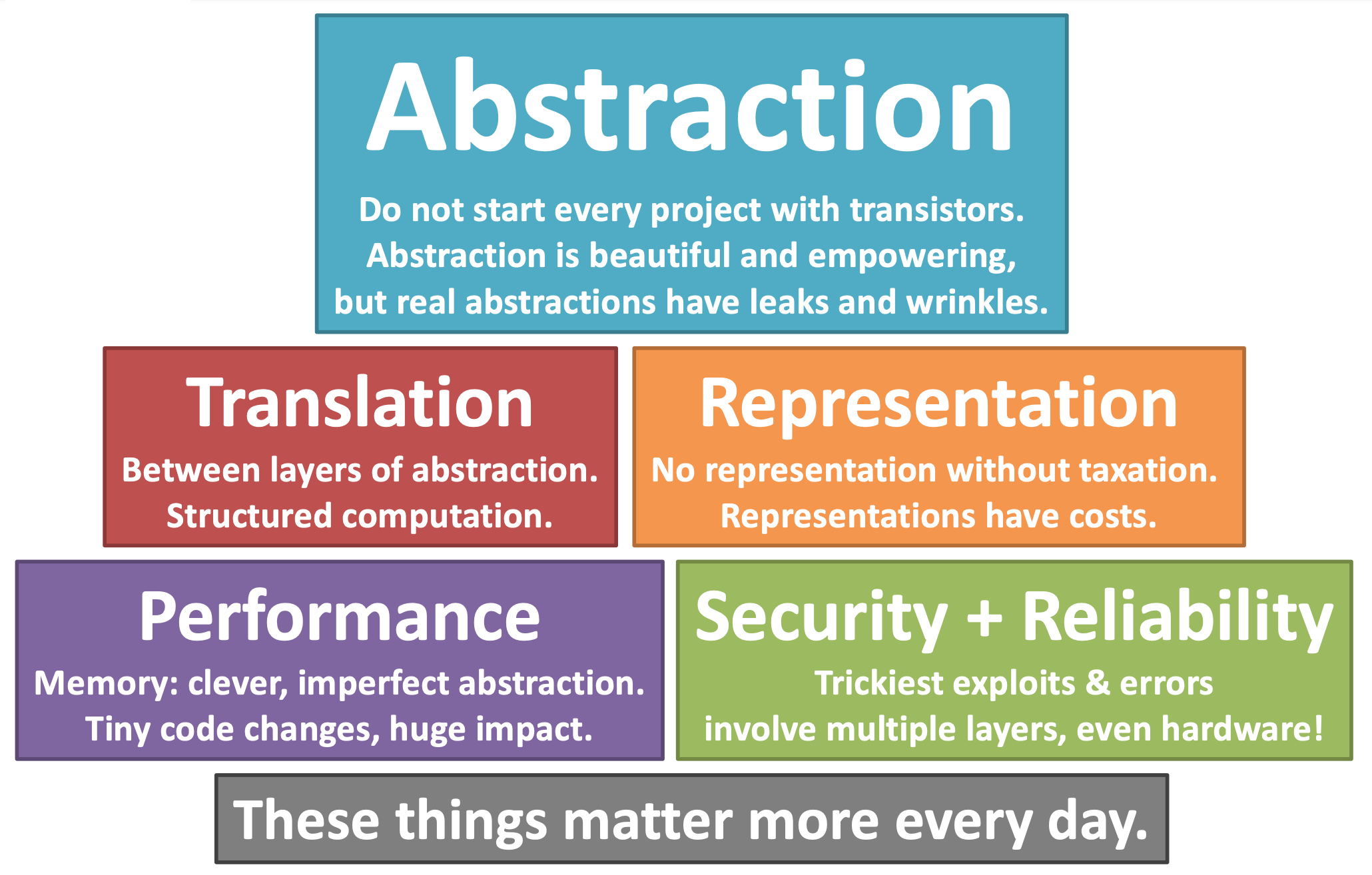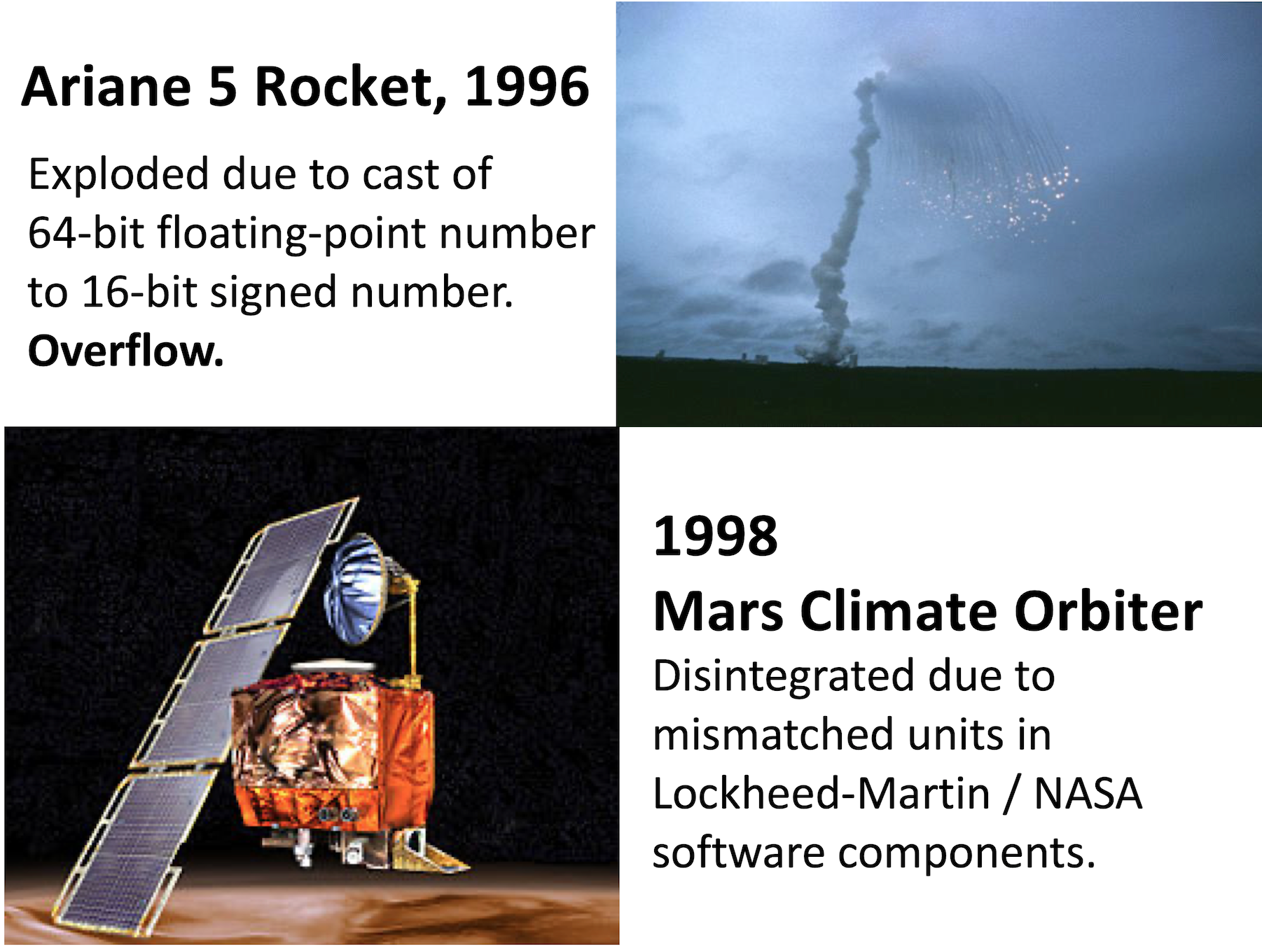CS 208 f21 — Victory Lap
1 Coursework Beyond 208
- CS 251 Programming Langauges
- CS 231 Computer Security
- CS 257 Software Design
- CS 331 Computer Networks
- CS 332 Operating Systems
- CS 334 Database Systems
- CS 348 Parallel and Distributed Computing
2 Skills to Carry Forward
- Few of you will build new HW, OS, compiler, but…
- Effective programmers and computer scientists understand their tools and systems.
- The skills and ideas you learn here apply everywhere.
- Reason about computational models, translation.
- Debug for correctness and performance (with tools to help).
- Assess costs and limits of representations.
- "Figure it out" via documentation, experiments, critical thinking.
- Remember low-level implications of high-level choices.
3 Big Ideas

3.1 Abstractions and Interfaces
- Computing is about abstractions
- What are the abstractions that we use?
- What do you need to know about them?
- When do they break down and you have to peek under the hood?
- What bugs can they cause and how do you find them?
- How does the hardware relate to the software?
- Become a better programmer and begin to understand the important concepts that have evolved in building ever more complex computer systems
3.2 Representation
- All digital systems represent everything as 0s and 1
- "Everything" includes:
- Numbers — integers and floating point
- Characters — the building blocks of strings
- Instructions — the directives to the CPU that make up a program
- Pointers — addresses of data objects stored away in memory
- Encodings are stored throughout a computer system
- In registers, caches, memories, disks, etc.
- They all need addresses (a way to locate)
- Find a new place to put a new item
- Reclaim the place in memory when data no longer needed
3.3 Translation
- There is a big gap between how we think about programs and data and the 0s and 1s of computers
- Need languages to describe what we mean
- These languages need to be translated one level at a time
- We know Java and/or Python as a programming language
- Have to work our way down to the 0s and 1s of computers
- Try not to lose anything in translation!
- We encountered C language, assembly language, and machine code (for the x86 family of CPU architectures)
3.4 Control Flow
- How do computers orchestrate everything they are doing?
- Within one program:
- How do we implement if/else, loops, switches?
- What do we have to keep track of when we call a procedure, and then another, and then another, and so on?
- How do we know what to do upon “return”?
- Across programs and operating systems:
- Multiple user programs
- Operating system has to orchestrate them all
- Each gets a share of computing cycles
- They may need to share system resources (memory, I/O, disks)
- Yielding and taking control of the processor
- Voluntary or “by force”?
4 C Programming
- a hands-off language that "exposes" more of hardware (especially memory)
- weakly-typed language that stresses data as bits
- anything can be represented with a number!
- Unconstrained pointers can hold address of anything
- no bounds checking!
5 In Context



6 How Do We Improve Computer Systems?
- Efficiency
- Time, space, programmer time
- Cost, availability https://opendatakit.org/about/deployments/
- Energy, materials http://www.nytimes.com/2015/06/07/magazine/making-and-unmaking-the-digital-world.html?_r=0
- Programmability
- Maintainability, creativity, accesibility, inclusivity, debuggability, testability
- Reliability
- Correctness, safety, predictability,
- Auditability, provability, analyzability, transparency
- Security, privacy
- Ownership, control, openness, privacy, rights
- Who owns/controls computing infrastructure, computation/software, data?
- How can systems support personal rights or prevent their compromise?